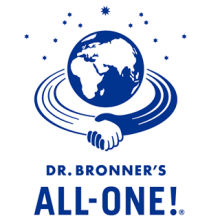
Five generations in the making, one lean, green, cleaning machine is shaking up the soap industry. Family-owned soap company Dr. Bronner’s has kept itself busy, constantly working to perfect the craft of ethical, organic soap-making.
The company was founded in 1948 by Emanuel Bronner, a German-Jewish immigrant determined to “unite Spaceship Earth” by preaching religious and ethnic tolerance. By 1950, he frequented San Francisco’s Pershing Square to spout his moral philosophy and sell handmade soap on the side. But after observing onlookers leaving his lectures early with peppermint soaps in hand, he had to find a new way to spread his message: printing his speeches on his soap packaging. By the 1960’s, Dr. Bronner’s Pure Castile Liquid Soap had become a counterculture icon, known for its wordy labels promoting peace, love, and prosperity for people and the planet.
Fast forward to the present, and the soap visionary has stayed true to its message.
Prioritizing environmental stewardship, Dr. Bronner’s is always looking for opportunities to clean up its supply chain beginning with its number-one sourced ingredient: coconut oil. Around ten years ago, Dr. Bronner’s established its first organic coconut oil project in Sri Lanka. Shortly afterwards, Dr. Bronner’s put itself on the map of environmentally and socially-responsible sourcing with the establishment of first-ever organic and fair trade palm oil project. Having seen first-hand the benefits of close partnerships with smallholder farmers, Dr. Bronner’s currently works alongside suppliers on the ground in Samoa, India, Ghana, and Palestine, and intends to expand.
“What we like to do is have a closer connection with our supply chain and the farmers that supply us, and one of the greatest ways to do that is through fair trade,” organic and fair trade coordinator Ryan Zinn said, phoning from Dr. Bronner’s coconut oil project in Samoa. There are currently 1500 farmers involved with the Samoa coconut oil project alone.
Supplying around 90 percent of Dr. Bronner’s raw materials, this vast network of smallholder farm projects allows the soap company to support and advance responsible agricultural practices globally. Now, Dr. Bronner’s is committed to progressing this model of partnership to achieve its ambition of carbon neutrality by 2020, all while ensuring that farmers receive fair compensation and setting a precedent of supply chain transparency.
There are two chief agricultural methods that Dr. Bronner’s uses to realize its aspiration to be carbon neutral. The first is regenerative agriculture, in which practices like conservation tillage and crop rotation can boost soil health, creating an effective a carbon sink. In order to encourage regenerative practices, Dr. Bronner’s has received a grant from the German government to increase the soil CO2 content by producing and distributing compost at its smallholder farm projects in India. Healthier soil then promotes better healthier crops, which constitute another carbon sink.
“The vast majority of our raw materials come from tree crops, and trees are fantastic photosynthesizers and sequester carbon,” Zinn explained. “My guess is that we will be carbon negative [by 2020]. When you bring together regenerative organic practices with tree crops, you can’t help but sequester tons of carbon.”
The second strategy is dynamic agroforestry, in which trees and shrubs are planted among crops to improve biodiversity and reduce soil erosion. The higher plant density and securitization of soil also results in significant carbon sequestration, while also boosting economic stability for farmers.
“We’re moving beyond the organic and fair trade and focusing in on dynamic agroforestry, which brings together coconut oil, cocoa, and a number of other crops,” Zinn explains. “[This] can diversify incomes and stabilize farms in the face of climate change.”
Dr. Bronner’s has become a leader in today’s soap industry, boasting an annual $120 million in sales, by staying true to its original mission of serving people and the planet. Dr. Bronner’s has successfully pioneered and continues to improve a business model in which social responsibility and environmental consciousness serve as uncompromising components of the its corporate identity, culture, and supply systems.
“One thing I try to constantly communicate to friends in the regenerative space is that it’s impossible to have any type of regenerative practice without farmers getting compensated,” Zinn explained. “Without good partnerships with farmers and compensating them fairly for the amazing work they do, there isn’t a future.”
“We’re always happy to share all of our successes and mistakes we’ve made along the way,” Zinn continued. “There isn’t a whole lot of precedent [for large-scale regenerative agriculture projects], and we’re excited to share skills, resources, consultants, and everything in between.”


